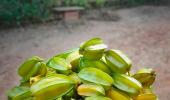Do not let the season or weather be an excuse for you to skip your daily dose of physical activity, advises rediffGURU Dr Karthiyayini Mahadevan.
- Health-related questions? Ask rediffGURU Dr Karthiyayini HERE.

Seasons can bring so many changes in the human body.
And each one's body responds differently to these changes.
Understanding these changes can help us prepare for the exchange of energy between the environment and human beings.
In the summer months, the sun's heat can range from warm to very hot, especially in humid places, with day temperatures going up to 42 to 45 degrees Celsius in certain parts of India.
We must remember that the human body comprises approximately 70 per cent water. There are various hormones in the body that regulate our body fluids, thus impacting the thirst mechanism and kidney functions.
The excessive heat during summer directly affects the body's fluid system. We lose approximately 1.5 to 2 litres of fluid daily, mainly through urine produced by the kidneys, apart from fluid loss through breathing, sweating and bowel movements.
The daily loss of body fluids may vary depending on the humidity of the location; hot and humid weather can cause excessive sweating, requiring additional fluid intake.
1. Drink plenty of water
The human body requires approximately 2.5 to 3 litres of fluid during hot summer months.
Fluid intake isn't limited to water but also includes juices, beverages and soups.
It is advisable to increase your daily water and fluid intake to make up for the loss of fluids and stay well hydrated.
Poor hydration may lead to dizziness, mild constipation, a loss of appetite, urinary infection and kidney stones.
If you have a heart or kidney problem, follow your physician's advice as far as fluid intake is concerned.
2. Go seasonal
Seasonal vegetables are meant to protect us during the summer.
You must include cucumbers, gourds, zucchini, carrots and tomatoes in your daily diet.
You can incorporate portions of water-rich fruits like watermelon, musk melon, mangoes and grapes in your breakfast.
Consuming herbal drinks made from seasonal produce can help keep your body cool. For instance, nannari roots available in southern India have a cooling effect. This can be consumed by soaking them in water stored in earthenware pots or by drinking a sherbet made from them.
In certain parts of Maharashtra, a kokum drink is prepared during summer to cool the body.
Similarly, a raw mango drink known as Aam Panna provides a special cooling effect to the system.
Incorporating buttermilk and tender coconut into your daily fluid intake is an excellent way to stay hydrated, prevent dehydration and promote healthy gut flora.
3. Summer-friendly workouts
Do you hate the idea of working out in the summer?
Do not let the season or the weather be an excuse for you to skip your daily dose of physical activity.
Remember that the average temperatures are usually cooler in the morning hours.
You can step out for a walk either in the early morning hours, before 7 am, or in the evenings after 6 pm.
This will help -- and this is particularly important for the elderly -- to avoid excessive fluid loss.
Participating in water-based exercises such as swimming or aqua yoga is highly recommended.
If you are on a holiday, using a jacuzzi or engaging in aqua sports will help prevent excessive dehydration.
However, if you are suffering from a health issue, it is advisable to first consult with your physician as to what might be best for you.
4. Skin friendly clothing
Wearing white and lighter colours will prevent heat retention to some extent, thus reducing the risk of heat exhaustion.
Opt for pure cotton innerwear as it absorbs sweat and keeps the skin healthy.
5. Wear sunscreen
Use sunscreen lotions that offer specific protection against UVA (ultraviolet radiation) and UVB radiation to shield your skin from the sun's harmful rays.
Look for a sunscreen with a minimum SPF (sun protection factor) of 30; anything higher will be more beneficial.
6. Avoid immediate transition
If you are travelling to work, avoid transitioning directly from outdoor heat to air-conditioned rooms.
Allow your body to cool down naturally before entering air-conditioned spaces.
Remember that air conditioning also dehumidifies; this might make your skin dry.
It would help if you can use ACs sparingly and ventilate your rooms appropriately to prevent mould.
Whenever possible, you can switch off the air conditioning and train your body to adjust to regular room temperature.
Following these simple and mindful practices can help your body stay cool and healthy in the summer.
- Health-related questions? Ask rediffGURU Dr Karthiyayini HERE.

Disclaimer: All content and media herein is written and published online for informational purposes only. It is not a substitute for professional medical advice. It should not be relied on as your only source for advice.
Please always seek the guidance of your doctor or a qualified health professional with any questions you may have regarding your health or a medical condition. Do not ever disregard the advice of a medical professional, or delay in seeking it because of something you have read herein.
If you believe you may have a medical or mental health emergency, please call your doctor, go to the nearest hospital, or call emergency services or emergency helplines immediately. If you choose to rely on any information provided herein, you do so solely at your own risk.
Opinions expressed herein cannot necessarily provide advice to fit the exact specifics of the issues of the person requesting advice.










